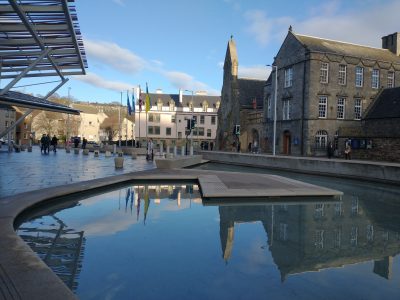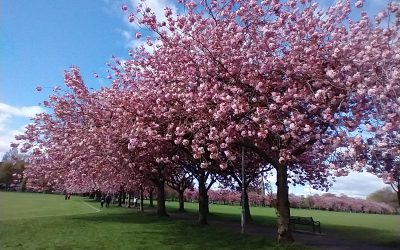 I was looking through the list of candidates for a concerto competition recently and was struck by the list of pieces they were playing.
I was looking through the list of candidates for a concerto competition recently and was struck by the list of pieces they were playing.
Mozart (lots), Haydn (several), Beethoven (several), Mendelssohn (several), Schumann (several), Chopin, Brahms (several), Grieg, Tchaikovsky, Saint-Saens, Elgar, Strauss, Rachmaninov (several), Bartok, Prokofiev, Kabalevsky, Shostakovich. Hardly anything written in the past three-quarters of a century.
I mused over the lack of contemporary music. There could be several reasons for it: the concerto form may be less popular with modern composers, so perhaps they are not writing new showpieces. Or: competitors want to be popular with audiences and think they’re more likely to succeed with tuneful classics. Or: they know that rehearsal time with the orchestra is limited, and so they don’t dare to choose anything that will take extra time for everyone to get to grips with. And so on.
The lack of new repertoire in a list such as the one I was studying does strike me as a problem, or at least evidence of a problem building up. We need young musicians to feel connected to the music they play. Of course they are allowed to love Mozart and Beethoven etc, but one would hope they would feel close to the music of their own time as well. It should be natural to like and be involved in the music of your own day.
For that to be the case, the music of their own day would have to appeal to them. And quite often it doesn’t. It may be difficult to read, time-consuming to learn or challenging to listen to. Fans of contemporary music may think I’m wrong about that. But how else to account for the fact that young musicians are choosing to play music from 75, 100, 200 years ago? And where are the lovable pieces they could be learning instead?




It will be interesting to see what the pianists chose for the next BBC Young Musician competition.
Susan, thanks for this thought-provoking post. On my blog, No Dead Guys (which is devoted to the piano music of living composers), I have many conversations with composers and many of them will tell you they’re not writing concertos because a) they’re not commissioned to write one, and b) if they write one, its unlikely that orchestras will program it. The “big” names still premier concertos every year or so, but few others. I suspect any change will have to happen through orchestra management, not through composers or (by extension) performers.
Thank you Rhonda, this is all very interesting.
As with so many other aspects of our strange profession, basically the gatekeepers will have to change before things change. How does one get to be a gatekeeper, deciding what gets played and who gets to play it?
It’s often quite mysterious.
Interesting comments, Susan. Like you I’m deeply moved by classical music. But I feel we are all a little bit trapped by the definition of the “classical” genre of music.
What about the great American songbook of contemporary music by Berlin/Porter/Mercer/Gershwin and many others as performed by the likes of Duke Ellington/Louis Armstrong/Ella Fitzgerald etc, from about the 1920s to the 1950s?
And the veritable explosion of what one could term “rock” music from the mid 1950s to about the mid 1970s? I smile when I think of the lyrics of “Roll Over Beethoven” written by Chuck Berry in about 1955. Many of the musicians from this era, including all the Beatles and the Stones could neither read nor write down music in classical terms, nevertheless the music they produced was marvellous. Is their music and that of the American songbook not “contemporary” too?
Just a thought. Best wishes in 2024.
I’m totally with you about the Great American Songbook. And your point about ‘labels’ is a good one!
Hello Susan,
As I started to read your blog, I had just come off reading about your new book, featuring neglected women composers. I was fully expecting that was what you’d be mentioning as music that’s not being performed by competition competitors. That seems to me to be another problem, and with the increasing exposure on radio, and in recitals, hopefully, we’ll be gearing more compositions by women in future competitions.
Someone needs to be bold enough to take chances, and maybe that’s as important as winning?
Michael, I’m sorry it has taken me so long to put your comment on my blog. I somehow didn’t see it until now! You make a good point about women’s music in piano competitions. I don’t think I have ever known someone play a concerto by a woman in a piano competition. I expect they have by now, but I just haven’t come across it. Let’s hope more good music by women will find its way into competition repertoire.
I visited Weimar recently and it was paradise; free from tourists (who probably don’t relish -10 degree days just after New Year), full of the fascinating spirit of historic musicians including Bach, Liszt and Wagner, and with a seemingly flourishing music scene.
I was lucky enough to hear a lovely concert where a young pianist played Kapustin’s 5th concerto along with Gershwin’s evergreen Rhapsody in Blue (100 this year!). It was a fabulous concert and the audience seemed to love both concertos – one mainstream, the other quite niche.
Perhaps a solution to the problem you mention could be to bring back the multi-concerto concert. The orchestra could play a piece or two, and then the instrumental soloist could play two works, one well-known, the other more obscure. I don’t understand why it doesn’t happen much more often, especially given that there are a lot of single-movement concert rondos for piano and orchestra.
I think that’s a good idea, James, and thinking about it I realise I don’t actually know many single-movement pieces for piano and orchestra. Your suggestion has made me decide to do some research!